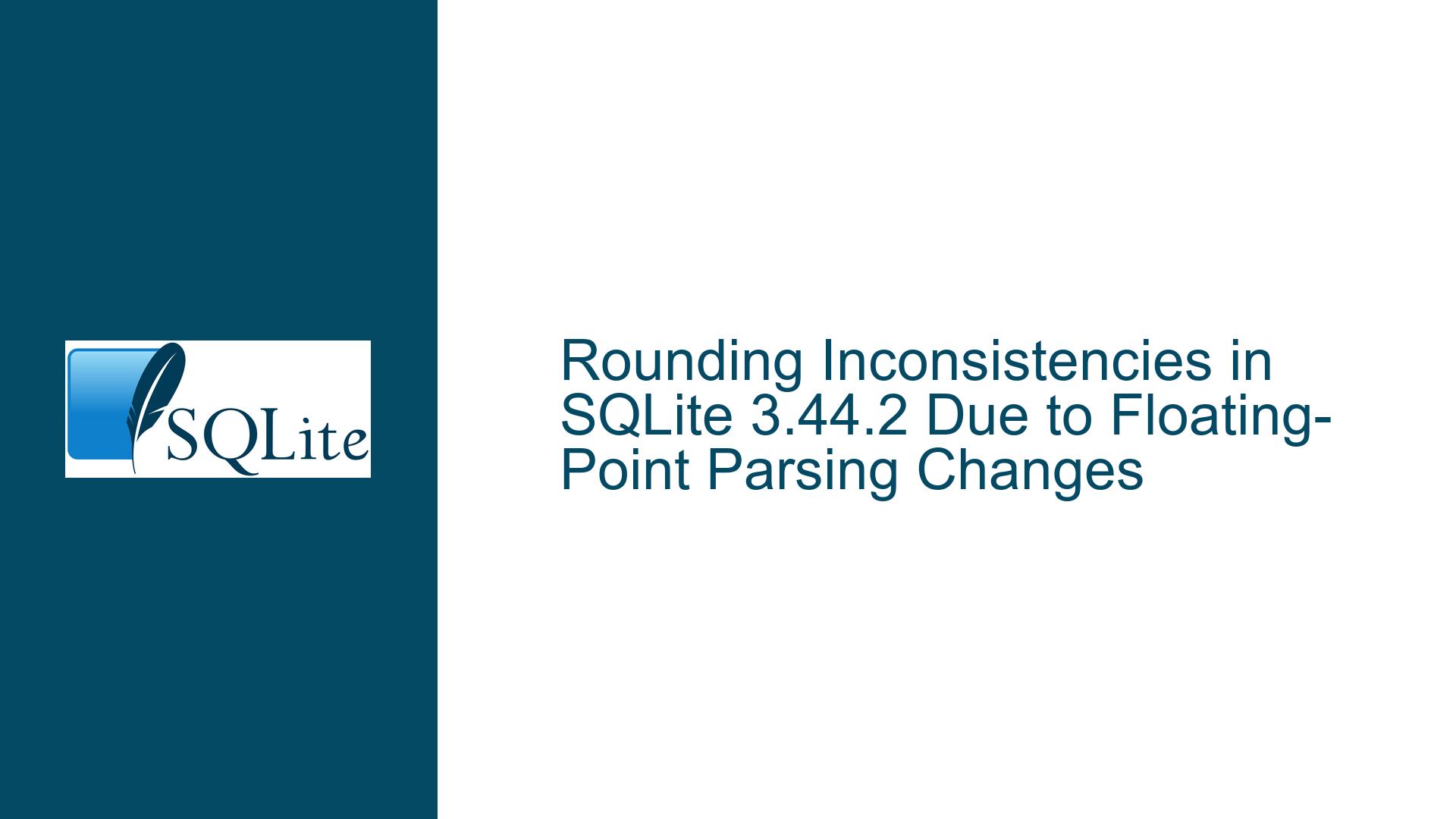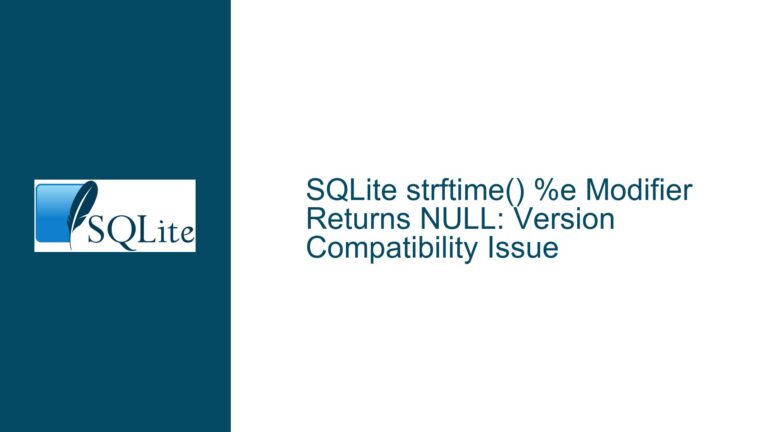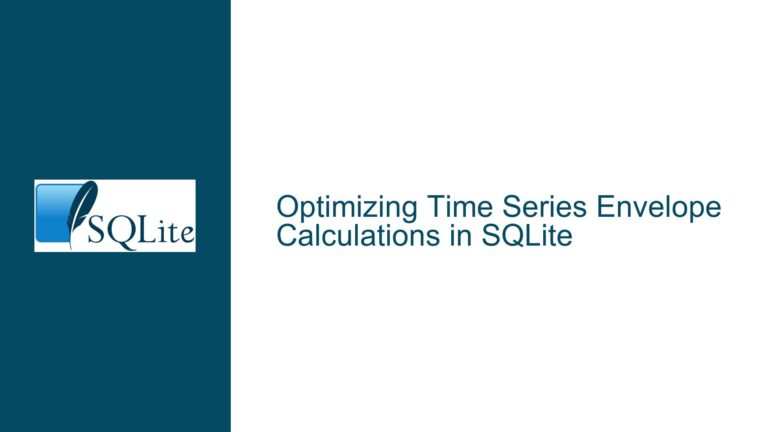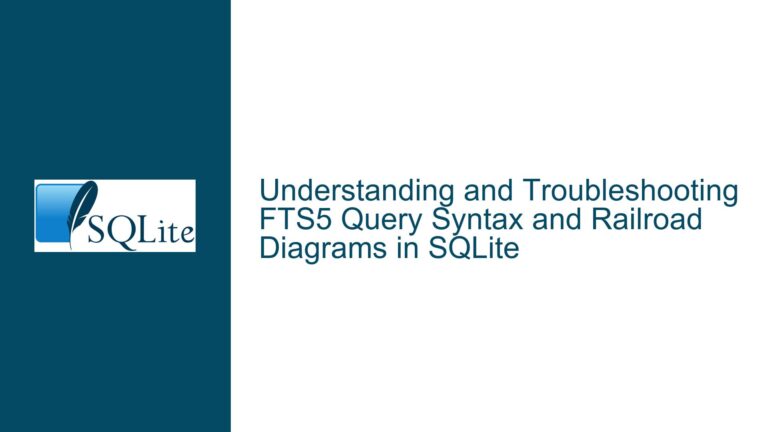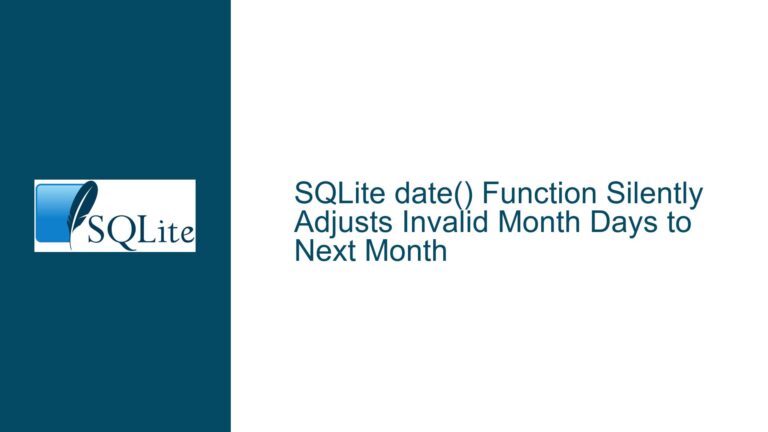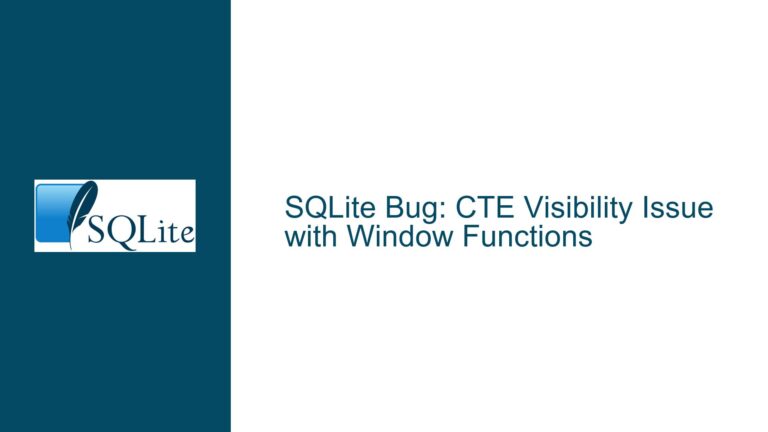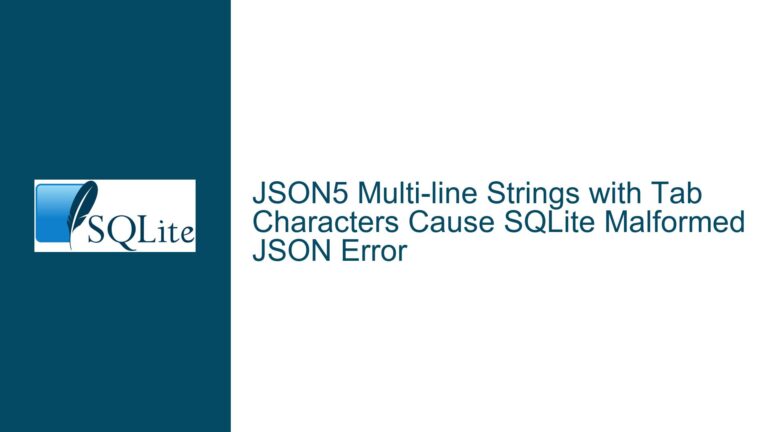Rounding Inconsistencies in SQLite 3.44.2 Due to Floating-Point Parsing Changes
Unexpected Discrepancies in ROUND() Function Output Between SQLite Versions 3.42.0 and 3.44.2
Observed Behavior: Mismatched Rounding Results for Computed Floating-Point Values
The core issue revolves around unexpected changes in the output of the ROUND() function when applied to computed floating-point values in SQLite versions after 3.42.0. Users report that arithmetic expressions such as 12.7 * 0.35 yield different rounded results depending on the SQLite version. For example:
- SQLite 3.42.0:
ROUND(12.7 * 0.35, 2)returns 4.45 - SQLite 3.44.2:
ROUND(12.7 * 0.35, 2)returns 4.44
This discrepancy becomes critical when comparing results across database systems (e.g., PostgreSQL, SQL Anywhere) or when upgrading SQLite versions in applications expecting stable rounding behavior. The problem is not isolated to computed values—direct literals like ROUND(4.445, 2) still return 4.45 in both versions, highlighting the role of how intermediate floating-point values are parsed and processed.
Key Observations:
- Version-Specific Parsing: The difference arises from how floating-point literals (e.g.,
12.7,0.35) are parsed and stored internally before computation. - Impact on Applications: Systems relying on precise rounding logic (financial calculations, data validation) may encounter silent data corruption or validation failures after upgrading SQLite.
- Cross-Database Compatibility: Other databases like PostgreSQL return 4.45 for the same query, creating interoperability challenges.
Root Cause Analysis: Floating-Point Precision and Internal Parsing Logic Changes
1. IEEE 754 Double-Precision Limitations
SQLite uses IEEE 754 double-precision floating-point numbers for arithmetic operations. Many decimal values (e.g., 12.7, 0.35, 4.445) cannot be represented exactly in binary floating-point format, leading to approximations. For instance:
12.7→12.6999999999999992894572642398998141288757324218750.35→0.34999999999999997779553950749686919152736663818359375
When multiplied, these approximations produce a result slightly less than the exact mathematical product (4.445), specifically:
4.44499999999999939603867460391484200954437255859375
Why Rounding Differs:
- Pre-3.44.2 Behavior: Earlier SQLite versions parsed literals with less precision, leading to slightly higher intermediate values. For example,
12.7might have been stored as a value closer to12.700000000000001, causing the product to round up to 4.45. - Post-3.44.2 Behavior: Improved parsing logic (via
sqlite3FpDecodeand alternate-form-2printfflags) captures more precise approximations, revealing the true product closer to4.4449999999999994, which rounds down to 4.44.
2. Changes in printf Functionality and Literal Parsing
The introduction of the alternate-form-2 flag in SQLite’s printf implementation (%!f) altered how floating-point values are converted to strings and stored internally:
- Prior Logic: Floating-point literals were parsed with fewer significant digits, masking subtle rounding errors.
- New Logic: The alternate-form-2 flag forces 26 significant digits (up from 16), exposing more precise—but still approximate—representations of literals.
This change propagated to functions like ROUND(), which now operate on more accurately parsed (yet still inexact) values.
3. Cross-Environment Comparisons
The discrepancy highlights a broader divide in how systems handle floating-point arithmetic:
- Databases (PostgreSQL, SQL Anywhere): Often use software-based decimal arithmetic for exact precision, yielding 4.45.
- Compiled Languages (Python, Rust, C): Rely on hardware-level IEEE 754 operations, producing 4.44 for the same computation.
- SQLite’s Approach: Post-3.44.2 aligns with compiled languages, prioritizing IEEE 754 compliance over backward compatibility.
Resolving Rounding Inconsistencies: Strategies for Cross-Version and Cross-Platform Compatibility
1. Mitigation Through Explicit Data Typing and Casting
Problem: Computed values inherit the imprecision of IEEE 754 doubles.
Solution: Use CAST to enforce string-based intermediate storage, bypassing binary approximation:
SELECT
ROUND(CAST(12.7 AS TEXT) * CAST(0.35 AS TEXT), 2)
This forces SQLite to parse the literals as strings and perform arithmetic with full decimal precision, though at a performance cost.
Trade-Offs:
- Accuracy: Reduces rounding errors by avoiding early binary conversion.
- Compatibility: Ensures consistent results across SQLite versions.
- Limitations: Not feasible for large datasets due to increased computational overhead.
2. Leveraging printf for Controlled Rounding
Problem: The ROUND() function’s output depends on internal parsing nuances.
Solution: Use printf to format values before rounding, explicitly controlling precision:
SELECT
printf('%.2f', 12.7 * 0.35) -- Returns "4.44" in 3.44.2, "4.45" in 3.42.0
To unify behavior, combine printf with ROUND:
SELECT
ROUND(CAST(printf('%!20f', 12.7 * 0.35) AS REAL), 2)
This ensures the computed value is stringified with maximum precision before rounding.
3. Decimal Arithmetic via Extensions or Custom Functions
Problem: SQLite lacks native decimal data types.
Solution: Integrate a decimal arithmetic extension (e.g., decimal.c from SQLite’s extension gallery) or define custom functions:
// Sample C Implementation for Decimal Rounding
void decimal_round(sqlite3_context *ctx, int argc, sqlite3_value **argv) {
double val = sqlite3_value_double(argv[0]);
int precision = sqlite3_value_int(argv[1]);
// Implement exact decimal rounding logic here
sqlite3_result_double(ctx, rounded_val);
}
Register the function in SQLite:
SELECT decimal_round(12.7 * 0.35, 2) -- Returns 4.45 consistently
4. Version-Specific Query Optimization
Problem: Applications must support multiple SQLite versions.
Solution: Detect the SQLite version at runtime and adjust queries accordingly:
SELECT
CASE
WHEN sqlite_version() < '3.44.0' THEN ROUND(12.7 * 0.35 + 0.000000000000001, 2)
ELSE ROUND(12.7 * 0.35, 2)
END
This hack adds a negligible epsilon to nudge the result upward in older versions.
5. Schema Design for Precision-Critical Applications
Problem: Floating-point rounding errors propagate across operations.
Solution: Store values as integers scaled to the required precision (e.g., cents for currency):
CREATE TABLE transactions (
amount INTEGER -- Stores cents (e.g., 445 for $4.45)
);
INSERT INTO transactions VALUES (ROUND(12.7 * 0.35 * 100));
SELECT amount / 100.0 FROM transactions; -- Retrieves 4.44 or 4.45 unambiguously
6. Cross-Platform Testing and Baseline Validation
Problem: Other databases return different results for the same query.
Solution: Establish a test suite to validate critical queries across all supported platforms:
-- PostgreSQL
SELECT 12.7 * 0.35 AS product, ROUND(12.7 * 0.35, 2) AS rounded; -- 4.445 → 4.45
-- SQLite
SELECT 12.7 * 0.35, ROUND(12.7 * 0.35, 2), sqlite_version();
-- Compare outputs and log discrepancies
Automate this process to flag unexpected changes during CI/CD pipelines.
7. Compile-Time Configuration for Backward Compatibility
Problem: Upgrading SQLite introduces breaking changes in rounding logic.
Solution: Recompile SQLite with pre-3.44.2 floating-point parsing behavior (if feasible):
- Revert to the older
sqlite3FpDecodelogic. - Disable the alternate-form-2 flag for
printf.
Caution: This approach is not recommended for most users, as it sacrifices bug fixes and performance improvements.
Final Recommendations
- Audit Precision-Critical Queries: Identify all uses of
ROUND()and floating-point arithmetic in your codebase. - Standardize on Decimal Types: Use integer scaling or extensions for financial data.
- Version Locking: Pin SQLite to a specific version in environments where rounding consistency is paramount.
- Educate Teams: Ensure developers understand IEEE 754 limitations and their implications for cross-platform SQL.
By combining these strategies, teams can mitigate rounding discrepancies while balancing precision, performance, and cross-version compatibility.
